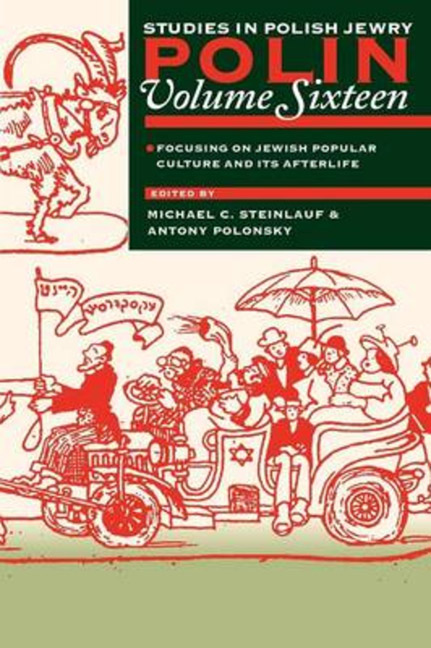Book contents
- Frontmatter
- Dedication
- Editors and Advisers
- Preface
- Polin
- Polin: Studies in Polish Jewry
- Contents
- Note on Place Names
- Note on Transliteration
- PART I JEWISH POPULAR CULTURE IN POLAND AND ITS AFTERLIFE
- IN PRE-WAR POLAND
- AFTERLIFE
- PART II DOCUMENTS
- PART III NEW VIEWS
- PART IV REVIEWS
- REVIEW ESSAYS
- BOOK REVIEWS
- Hillel J. Kieval, Languages of Community: The Jewish Experience in the Czech Lands
- Jacob Goldberg, Haḥevrah hayehudit bemamlekhet polin-lita
- Kristi Groberg and Avraham Greenbaum (eds.), A Missionary for History: Essays in Honor of Simon Dubnow
- Israel Kleiner, From Nationalism to Universalism: Vladimir Zéev Jabotinsky and the Ukrainian Question
- Konrad Zieliński, Żydzi Lubelszczyzny 1914–1918
- Jerzy Malinowski, Malarstwo i rzeźba Żydów polskich w XIX i XX wieku
- Kadya Molodowsky, Paper Bridges: Selected Poems of Kadya Molodowsky, ed. and trans. Kathryn Hellerstein
- Julian Tuwim, Utwory nieznane. Ze zbiorów Tomasza Niewodniczań skiego w Bitburgu: Wiersze, Kabaret, Artykuły, Listy, ed. Tadeusz Januszewski
- Stanisław Wielanek, Szlagiery starej Warszawy: Śpiewnik andrusowski
- Stanisław Wielanek, Party na Nalewkach
- Jan Tomasz Gross, Sa˛siedzi: Historia zagłady z.ydowskiego miasteczka
- Burning Questions: A Film by Mishael Porembski
- Martin Dean, Collaboration during the Holocaust: Crimes of the Local Police in Belorussia and Ukraine, 1941–44
- Jerzy Tomaszewski (ed.), Studia z dziejów i kultury Żydów w Polsce po 1945 roku
- Dagmar C. G. Lorenz (ed.), Contemporary Jewish Writing in Austria: An Anthology
- Romuald Jakub Weksler-Waszkinel, Błogosławiony Bóg Izraela
- CORRESPONDENCE
- OBITUARIES
- Notes on the Contributors
- Glossary
- Index
Jan Tomasz Gross, Sa˛siedzi: Historia zagłady z.ydowskiego miasteczka
from BOOK REVIEWS
- Frontmatter
- Dedication
- Editors and Advisers
- Preface
- Polin
- Polin: Studies in Polish Jewry
- Contents
- Note on Place Names
- Note on Transliteration
- PART I JEWISH POPULAR CULTURE IN POLAND AND ITS AFTERLIFE
- IN PRE-WAR POLAND
- AFTERLIFE
- PART II DOCUMENTS
- PART III NEW VIEWS
- PART IV REVIEWS
- REVIEW ESSAYS
- BOOK REVIEWS
- Hillel J. Kieval, Languages of Community: The Jewish Experience in the Czech Lands
- Jacob Goldberg, Haḥevrah hayehudit bemamlekhet polin-lita
- Kristi Groberg and Avraham Greenbaum (eds.), A Missionary for History: Essays in Honor of Simon Dubnow
- Israel Kleiner, From Nationalism to Universalism: Vladimir Zéev Jabotinsky and the Ukrainian Question
- Konrad Zieliński, Żydzi Lubelszczyzny 1914–1918
- Jerzy Malinowski, Malarstwo i rzeźba Żydów polskich w XIX i XX wieku
- Kadya Molodowsky, Paper Bridges: Selected Poems of Kadya Molodowsky, ed. and trans. Kathryn Hellerstein
- Julian Tuwim, Utwory nieznane. Ze zbiorów Tomasza Niewodniczań skiego w Bitburgu: Wiersze, Kabaret, Artykuły, Listy, ed. Tadeusz Januszewski
- Stanisław Wielanek, Szlagiery starej Warszawy: Śpiewnik andrusowski
- Stanisław Wielanek, Party na Nalewkach
- Jan Tomasz Gross, Sa˛siedzi: Historia zagłady z.ydowskiego miasteczka
- Burning Questions: A Film by Mishael Porembski
- Martin Dean, Collaboration during the Holocaust: Crimes of the Local Police in Belorussia and Ukraine, 1941–44
- Jerzy Tomaszewski (ed.), Studia z dziejów i kultury Żydów w Polsce po 1945 roku
- Dagmar C. G. Lorenz (ed.), Contemporary Jewish Writing in Austria: An Anthology
- Romuald Jakub Weksler-Waszkinel, Błogosławiony Bóg Izraela
- CORRESPONDENCE
- OBITUARIES
- Notes on the Contributors
- Glossary
- Index
Summary
Think of a short, accusatory book on a Jewish topic that has galvanized and divided a whole nation. If your first thought was Zola's J'accuse, your second should be Neighbors, by Jan T. Gross. The story that Gross tells is well known by now. On 10 July 1941, two weeks after the Germans arrived, a pogrom took place in the small town of Jedwabne, near Białystok. With the acquiescence of the German police, perhaps at their instigation, but without their major participation, townspeople and peasants from the surrounding countryside attacked the town's Jews. After several hours of beatings, torture, and individual murders, the remaining Jews were first assembled in the town square, and then herded into Bolesław Śleszynśki's barn, three streets away, which was doused in petrol and set alight. But for a few who managed to run away and hide, all the town's Jews perished that day, at the hands of their Polish neighbours.
Although townspeople had always known who the perpetrators were, and spoke about it openly among themselves, the facts of the case were not widely disseminated. The trials of twenty-three Poles in 1949 and 1953 took place without publicity, and the official line throughout the communist era, reflected in a commemorative plaque displayed in the town until recently, was that the Germans had done it. Historians during that era did not question the official view: even the Jewish historian Szymon Datner, in a 1966 survey of the Holocaust in the Białystok region, felt free to say only that some ‘social outcasts’ had been involved. Not until nearly a decade after the end of communism did Agnieszka Arnold's 1998 documentary Gdzie mój starszy brat Kain? (‘Where is my Elder Brother Cain?’) finally break the silence. An interview in the film with Śleszynśki's daughter, who spoke of the events candidly, spurred Gross to write the first full historical treatment, nearly sixty years after the event. Ironically, Gross's opponents accuse him of ‘hasty judgements’.
Gross allowed a year to elapse between the publication of the Polish and English editions, to give Poles a chance to debate the matter before the international spotlight fell on it.
- Type
- Chapter
- Information
- Focusing on Jewish Popular Culture and Its Afterlife , pp. 529 - 543Publisher: Liverpool University PressPrint publication year: 2003



